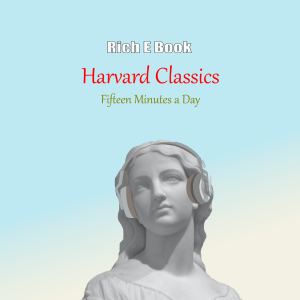
279.4K
Downloads
736
Episodes
Former President of Harvard University Charles W. Eliot wrote in his introduction to the Harvard Classics, "In my opinion, a five-foot shelf would hold books enough to give a liberal education to any one who would read them with devotion, even if he could spare but fifteen minutes a day for reading." Here you are, you can easily listen to his entire 15-minutes-a-day study guide while commuting to and from work (most of us spend far more than 15 minutes a day commuting each day), doing mundane work in the office, washing dishes at home, or doing most of the things day in and day out. It is so easy, so entertaining, and so educational that they can be listened to again and again, until they permeate into our own thinking and into our characters. Perhaps, in one year's time, you will become someone you barely recognize, all for the better. Who knows?
-- Rich E Book
Episodes

Friday Mar 11, 2022
Introductory Note: Ralph Waldo Emerson
Friday Mar 11, 2022
Friday Mar 11, 2022
Introductory note on Ralph Waldo Emerson (Volume 5, Harvard Classics)

Friday Mar 11, 2022
Compensation, by Ralph Waldo Emerson
Friday Mar 11, 2022
Friday Mar 11, 2022
We are paid for our suffering and we pay for our happiness. Every ache, every sorrow receives its recompense here on earth. Emerson gives the basis for this conviction. (Volume 5, Harvard Classics)
Emerson ordained Unitarian minister, March 11, 1829.

Thursday Mar 10, 2022
Introductory Note: Beaumont and Fletcher
Thursday Mar 10, 2022
Thursday Mar 10, 2022
Introductory note on Beaumont and Fletcher (Volume 47, Harvard classics)

Thursday Mar 10, 2022
Philaster (Act I), by Beaumont and Fletcher
Thursday Mar 10, 2022
Thursday Mar 10, 2022
In the days when contact with the theatre meant exile from the best society, Beaumont and Fletcher, men from good families, dared to ally themselves with the stage as playwrights. "Philaster" won them immortal praise. (Volume 47, Harvard Classics)

Wednesday Mar 09, 2022
Introductory Note: Jonathan Swift
Wednesday Mar 09, 2022
Wednesday Mar 09, 2022
Introductory note on Jonathan Swift (Volume 27, Harvard classics)

Wednesday Mar 09, 2022
A Treatise on Good Manners and Good Breeding, by Jonathan Swift
Wednesday Mar 09, 2022
Wednesday Mar 09, 2022
Swift regretted the laws against dueling because dueling at least was a good means of ridding the country of bores and fools. His keen eye penetrated social customs and saw the common sense that governed good manners. (Volume 27, Harvard Classics)
Passage of laws against dueling in England, March 9, 1679.

Tuesday Mar 08, 2022
Introductory Note: Miguel de Cervantes
Tuesday Mar 08, 2022
Tuesday Mar 08, 2022
Introductory note on Miguel de Cervantes (Volume 14, Harvard Classics)

Tuesday Mar 08, 2022
Don Quixote (Vol. I, Part I, Ch. XXXIII), by Miguel de Cervantes
Tuesday Mar 08, 2022
Tuesday Mar 08, 2022
Anselmo and Lothario were close friends. Anselmo, anxious to learn if his wife were perfect, as he believed her to be, makes an unusual proposal to his old friend. (Volume 14, Harvard Classics)

Monday Mar 07, 2022
Introductory Note: Francis Bacon
Monday Mar 07, 2022
Monday Mar 07, 2022
Introductory note on Francis Bacon (Volume 3, Harvard Classics)

Monday Mar 07, 2022
Of Judicature, by Francis Bacon
Monday Mar 07, 2022
Monday Mar 07, 2022
Bacon pointed out that a judge's duty was to interpret laws and not to make laws. This single essay of Bacon's is a richly condensed summary of the ethics of law. (Volume 3, Harvard Classics)
Bacon made Keeper of the Great Seal of England, March 7, 1616.
